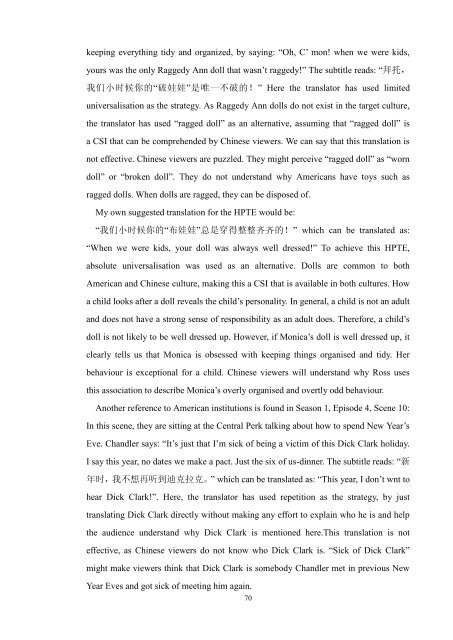View - Scholarly Commons Home
View - Scholarly Commons Home
View - Scholarly Commons Home
Create successful ePaper yourself
Turn your PDF publications into a flip-book with our unique Google optimized e-Paper software.
keeping everything tidy and organized, by saying: “Oh, C‟ mon! when we were kids,<br />
yours was the only Raggedy Ann doll that wasn‟t raggedy!” The subtitle reads: “拜托,<br />
我们小时候你的“破娃娃”是唯一不破的!” Here the translator has used limited<br />
universalisation as the strategy. As Raggedy Ann dolls do not exist in the target culture,<br />
the translator has used “ragged doll” as an alternative, assuming that “ragged doll” is<br />
a CSI that can be comprehended by Chinese viewers. We can say that this translation is<br />
not effective. Chinese viewers are puzzled. They might perceive “ragged doll” as “worn<br />
doll” or “broken doll”. They do not understand why Americans have toys such as<br />
ragged dolls. When dolls are ragged, they can be disposed of.<br />
My own suggested translation for the HPTE would be:<br />
“我们小时候你的“布娃娃”总是穿得整整齐齐的!” which can be translated as:<br />
“When we were kids, your doll was always well dressed!” To achieve this HPTE,<br />
absolute universalisation was used as an alternative. Dolls are common to both<br />
American and Chinese culture, making this a CSI that is available in both cultures. How<br />
a child looks after a doll reveals the child‟s personality. In general, a child is not an adult<br />
and does not have a strong sense of responsibility as an adult does. Therefore, a child‟s<br />
doll is not likely to be well dressed up. However, if Monica‟s doll is well dressed up, it<br />
clearly tells us that Monica is obsessed with keeping things organised and tidy. Her<br />
behaviour is exceptional for a child. Chinese viewers will understand why Ross uses<br />
this association to describe Monica‟s overly organised and overtly odd behaviour.<br />
Another reference to American institutions is found in Season 1, Episode 4, Scene 10:<br />
In this scene, they are sitting at the Central Perk talking about how to spend New Year‟s<br />
Eve. Chandler says: “It‟s just that I‟m sick of being a victim of this Dick Clark holiday.<br />
I say this year, no dates we make a pact. Just the six of us-dinner. The subtitle reads: “新<br />
年时,我不想再听到迪克拉克。” which can be translated as: “This year, I don‟t wnt to<br />
hear Dick Clark!”. Here, the translator has used repetition as the strategy, by just<br />
translating Dick Clark directly without making any effort to explain who he is and help<br />
the audience understand why Dick Clark is mentioned here.This translation is not<br />
effective, as Chinese viewers do not know who Dick Clark is. “Sick of Dick Clark”<br />
might make viewers think that Dick Clark is somebody Chandler met in previous New<br />
Year Eves and got sick of meeting him again.<br />
70

















